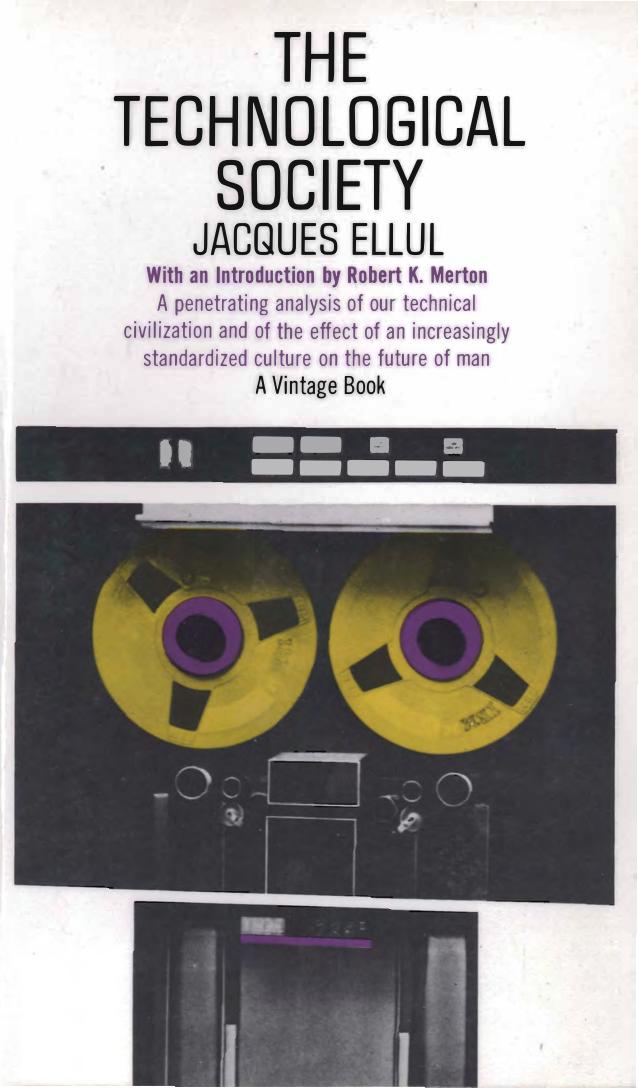The Technological Society by Jacques Ellul

Author:Jacques Ellul [Ellul, Jacques]
Language: eng
Format: epub, pdf, azw3
Published: 0101-01-01T00:00:00+00:00
It is in the realm of economic technique that we experience most clearly the great and dramatic process of modern times, in which both chance and natural laws are transformed into decisions of accountants, rules of planning, and decrees of the state. It is exactly at this point that technique begins to be concerned with natural fact—with the fact of total human behavior, with man’s spontaneous obedience to so-called sociological currents, with his conformity to certain general types, with his responses (almost everywhere the same) to given stimuli. Whether the question is one of understanding public opinion, or of stochastics, or of statistics as a whole, the technical starting point is always the human behavior of the majority. From this behavior, technique draws a number of consequences and modes of action, erecting on it the system into which it will necessarily insert itself. Moreover, it makes this behavior obligatory. It allows certain minor modifications (we shall not concern ourselves with the problem of aberrants), but its real problem is to transform a law spontaneously obeyed into a law made consciously obligatory. In no other domain is this procedure of technique as clear-cut as in the present forward movement of the economy. The effects of technique in other areas are not as evident; for example, the effects of “human techniques” such as propaganda have not yet been rendered obligatory to the same degree as technique in the economic field.
Thus, economic techniques, despite their still rudimentary nature (often more pronounced in this respect than mechanical, psychological, or judicial techniques), nevertheless express better than any others the transition, implied by every technique, from the natural to the artificial. It is not that economic techniques are better developed than the others, but that here, more than elsewhere, the artificial evolves from the natural.
Every technique tends, more or less, to constrain nature; accordingly, the artificial is opposed to the natural. There is a struggle, but whether it be expressed in terms of man against nature or in terms of the conflict of systems, the desideratum is a mastery that excludes, eliminates, and replaces the natural. Thus, for example, the directed and planned economy replaces liberalism. But we note in this domain another more subtle, integrative movement. Economic technique tends less to eliminate the natural than to integrate it. (In this sense it approaches the mode of action of physical techniques. And François Perroux’s criticism of planning, relative to its “lack of rationality,” rests on the fact that planning suppresses the free mechanism of the economy instead of adhering to it and interpreting it. The latter, for Perroux, should be the ideal of economic technique.)
But when the natural is integrated, it ceases to be natural. It becomes part of the technical ensemble. It is an element of the mechanism, an element which must play its role, and no more. The role may be plotted in advance. Even when, as in the case of servomechanisms, the improvement of technique introduces unforeseen elements and leaves a large part of the operation in the realm of the natural, it is nonetheless integrated.
Download
The Technological Society by Jacques Ellul.pdf
The Technological Society by Jacques Ellul.azw3
This site does not store any files on its server. We only index and link to content provided by other sites. Please contact the content providers to delete copyright contents if any and email us, we'll remove relevant links or contents immediately.
The Secret History by Donna Tartt(19083)
The Social Justice Warrior Handbook by Lisa De Pasquale(12190)
Thirteen Reasons Why by Jay Asher(8907)
This Is How You Lose Her by Junot Diaz(6885)
Weapons of Math Destruction by Cathy O'Neil(6279)
Zero to One by Peter Thiel(5798)
Beartown by Fredrik Backman(5751)
The Myth of the Strong Leader by Archie Brown(5507)
The Fire Next Time by James Baldwin(5440)
How Democracies Die by Steven Levitsky & Daniel Ziblatt(5218)
Promise Me, Dad by Joe Biden(5153)
Stone's Rules by Roger Stone(5087)
A Higher Loyalty: Truth, Lies, and Leadership by James Comey(4959)
100 Deadly Skills by Clint Emerson(4924)
Rise and Kill First by Ronen Bergman(4787)
Secrecy World by Jake Bernstein(4751)
The David Icke Guide to the Global Conspiracy (and how to end it) by David Icke(4717)
The Farm by Tom Rob Smith(4506)
The Doomsday Machine by Daniel Ellsberg(4489)
